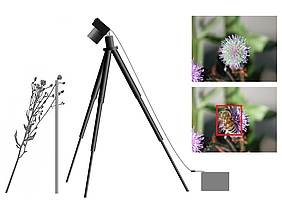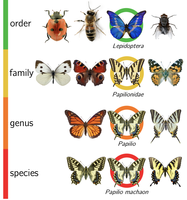Tools for rapid measurement of visitation networks


Pollination is critical to many ecosystem services, such as the maintenance of biodiversity and human nutrition. Addressing how plant-pollinator interactions change across environmental gradients requires quantifying pollinator visitation. We need new tools that allow for rapid data collection to increase the spatial and temporal sampling that is possible.
Ecologists typically observe pollinators in the field, record the species identity of the easily distinguished individuals, and collect with a net the remaining individuals so that they can be later identified to species in the lab. This is labor and time intensive, and thus prevents the massive data collection that is necessary to achieve a general, predictive understanding of how pollination responds to global change.
We use machine learning methods and technology to automatize ecological data collection on plant-pollinator interactions.
A first step is to develop and test a camera system capable of capturing clear images of visiting insects on flowers. Our first results use mobile phones for time-lapse photography, capturing images of flowers every 1-2 seconds with the goal of capturing images of insects visiting flowers (Fig .1). The pollinators in the collected images are identified by entomologists in our group down to the lowest possible taxonomic level (order > family > genus > species).
The second part of the project involves training state of the art Convolutional Neural Networks (CNN) with the goal of insect identification down to the lowest possible taxonomic level (Fig. 2). For this, we make use of our field images as well as images from online databases (e.g., iNaturalist and Observation.org). We focus on four orders of insect pollinators: Coleoptera, Diptera, Hymenoptera and Lepidoptera.
Our main goal is to develop an automated pipeline that can quantify the abundance and diversity of insects that visit flowers and the structure of plant-pollinator interactions across various environmental gradients in Europe.
How can you contribute?
If you have images of pollinators and you are willing to share them with us, feel free to contact Valentin Ștefan or Prof. Tiffany Knight
We also welcome your thoughts, ideas and collaboration.
Scientific investigators
UFZ/iDiv: Prof. Tiffany Knight , Valentin Ștefan & Maximilian Sittinger
DLR: Prof. Hannes Taubenböck, Thomas Stark, Dorothee Stiller, Dr. Michael Wurm & Robin Spanier
References
Boussioux, L., Giro-Larraz, T., Guille-Escuret, C., Cherti, M., & Kégl, B. (2019). InsectUp: Crowdsourcing Insect Observations to Assess Demographic Shifts and Improve Classification. arXiv preprint arXiv:1906.11898.
Steen, R. (2017). Diel activity, frequency and visit duration of pollinators in focal plants: in situ automatic camera monitoring and data processing. Methods in Ecology and Evolution, 8(2), 203-213.
News
2024, January
Maximilian Sittinger joined our team. We will work on adapting his AI capable camera for monitoring plant-pollinator interactions.
2023, September
Our paper "YOLO object detection models can locate and classify broad groups of flower-visiting arthropods in images" got published in Scientific Reports.
2022, September
Malika Nisal Ratnayake joined the team of Prof. Tiffany Knight, Species Interaction Ecology at iDiv, for a three-month research stay. His research stay is funded by the Green Talents scholarship awarded by the German Federal Ministry of Education and Research (BMBF).
Malika recently completed his PhD at the Faculty of Information Technology, Monash University, Australia. His research is focused on designing computer vision and artificial intelligence facilitated technologies for the advancement of pollination monitoring in agriculture and ecology.
2022, June
Robin Spanier presents the results of his master thesis at the Helmholtz AI conference.
2022, May
Valentin Ștefan started a 3 months research stay at the DLR in the team of Prof. Hannes Taubenböck, City and Society. The research stay is funded by the Helmholtz Information & Data Science Academy - HIDA Trainee Network.
2022, April
Find out more about our project in the Helmholtz AI News - "Helmholtz AI project call showcase: Pollination Artificial Intelligence. Transferring existing large-scale AI methods to the field of pollination ecology for the automatic classification of insect pollinators."
2021, November
We kicked off our UFZ-DLR collaboration for Pollination Artificial Intelligence (PAI).
Many thanks to the participants: Thomas Stark, Dorothee Stiller, Robin Spanier, Michael Wurm, and Prof. Hannes Taubenböck from DLR, and Valentin Ștefan and Tiffany Knight from UFZ/iDiv.
Robin Spanier started working on his MSc thesis " Pollination AI, Deep Learning approach to identify pollinators and their taxa using the YOLO architecture"
2021, August
Our project PAI - Pollination artificial intelligence is one of the 17 funded projects selected by the Helmholtz AI.
This sets our collaboration with the team of Prof. Hannes Taubenböck, City and Society.
